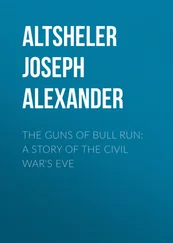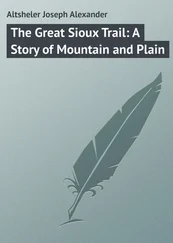Joseph Altsheler - The Last of the Chiefs - A Story of the Great Sioux War
Здесь есть возможность читать онлайн «Joseph Altsheler - The Last of the Chiefs - A Story of the Great Sioux War» — ознакомительный отрывок электронной книги совершенно бесплатно, а после прочтения отрывка купить полную версию. В некоторых случаях можно слушать аудио, скачать через торрент в формате fb2 и присутствует краткое содержание. Жанр: foreign_children, foreign_antique, foreign_prose, prose_military, на английском языке. Описание произведения, (предисловие) а так же отзывы посетителей доступны на портале библиотеки ЛибКат.
- Название:The Last of the Chiefs: A Story of the Great Sioux War
- Автор:
- Жанр:
- Год:неизвестен
- ISBN:нет данных
- Рейтинг книги:4 / 5. Голосов: 1
-
Избранное:Добавить в избранное
- Отзывы:
-
Ваша оценка:
- 80
- 1
- 2
- 3
- 4
- 5
The Last of the Chiefs: A Story of the Great Sioux War: краткое содержание, описание и аннотация
Предлагаем к чтению аннотацию, описание, краткое содержание или предисловие (зависит от того, что написал сам автор книги «The Last of the Chiefs: A Story of the Great Sioux War»). Если вы не нашли необходимую информацию о книге — напишите в комментариях, мы постараемся отыскать её.
The Last of the Chiefs: A Story of the Great Sioux War — читать онлайн ознакомительный отрывок
Ниже представлен текст книги, разбитый по страницам. Система сохранения места последней прочитанной страницы, позволяет с удобством читать онлайн бесплатно книгу «The Last of the Chiefs: A Story of the Great Sioux War», без необходимости каждый раз заново искать на чём Вы остановились. Поставьте закладку, и сможете в любой момент перейти на страницу, на которой закончили чтение.
Интервал:
Закладка:
Dick forced himself to go on. It required now moral, as well as physical, courage to approach that lost battlefield lying under its pall of night. Never was the boy a greater hero than at that moment. He advanced slowly. A bush caught him by the coat and held him an instant. He felt as if he had been seized in a man's grasp. He reached the first wagon, and it seemed to him, broken and rifled, an emblem of desolation. As he passed it a strange, low, whining cry made his backbone turn to ice. But he recovered and forced an uneasy little laugh at himself. It was only a wolf, the mean coyote of the prairies!
He came now into the space where the mass of the wagons and the fallen lay. Dark figures, low and skulking, darted away. More wolves! But one, a huge timber wolf, with a powerful body and long fangs, stood up boldly and stared at him with red eyes. Dick's own eyes were used to the darkness now, and he stared back at the wolf, which seemed to be giving him a challenge. He half raised his rifle, but the monster did not move. It was a stranger to guns, and this wilderness was its own.
It was Dick's first impulse to fire at the space between the red eyes, but he restrained it. He had not come there to fight with wolves, nor to send the report of a shot through the mountains. He picked up a stone and threw it at the wolf, striking him on the flank. The monster turned and stalked sullenly away, showing but little sign of fear. Dick pursued his task, and as he advanced something rose and, flapping heavily, sailed away. The shiver came again, but his will stopped it.
He was now in the center of the wreckage, which in the darkness looked as if it had all happened long ago. Nearly every wagon had been turned over, and now and then dark forms lay between the wheels. The wind moaned incessantly down the pass and over the ruin.
Overcoming his repulsion, Dick went to work. The moon was now coming out and he could see well enough for his task. There was still much gleaning left by the quick raiders, and everything would be of use to Albert and himself, even to the very gear on the fallen animals. He cut off a great quantity of this at once and put it in a heap at the foot of the cliff. Then he invaded the wagons and again brought forth treasures better than gold.
He found in one side box some bottles of medicine, the simple remedies of the border, which he packed very carefully, and in another he discovered half a sack of flour—fifty pounds, perhaps. A third rewarded him with a canister of tea and a twenty-pound bag of ground coffee. He clutched these treasures eagerly. They would be invaluable to Albert.
Continuing his search, he was rewarded with two pairs of heavy shoes, an ax, a hatchet, some packages of pins, needles, and thread, and a number of cooking utensils—pots, kettles, pans, and skillets. Just as he was about to quit for the purpose of making up his pack, he noticed in one of the wagons a long, narrow locker made into the side and fastened with a stout padlock. The wagon had been plundered, but evidently the Sioux had balked at the time this stout box would take for opening, and had passed on. Dick, feeling sure that it must contain something of value, broke the padlock with the head of the ax. When he looked in he uttered a cry of delight at his reward.
He brought forth from the box a beautiful double-barreled breech-loading shotgun, and the bounty of chance did not stop with the gun, for in the locker were over a thousand cartridges to fit it. Dick foresaw at once that it would be invaluable to Albert and himself in the pursuit of wild ducks, wild geese, and other feathered game. He removed some of the articles from his pack, which was already heavy enough, and put the shotgun and cartridges in their place. Then he set forth on the return journey.
As he left the wagons and went toward the mouth of the pass, he heard soft, padding sounds behind him, and knew that the wolves were returning, almost on his heels. He looked back once, and saw a pair of fiery red eyes which he felt must belong to the monster, the timber wolf, but Dick was no longer under the uncanny spell of the night and the place; he was rejoicing too much in his new treasures, like a miser who has just added a great sum to his hoard, to feel further awe of the wolves, the darkness, and a new battlefield.
Dick's second pack was heavier than his first, but as before, he trod lightly. He took a different path when he left the pass, and here in the moonlight, which was now much brighter, he saw the trace of wheels on the earth. The trace ran off irregularly through the short bushes and veered violently to and fro like the path of a drunken man. Dick inferred at once that it had been made, not by a wagon entering the pass, but by one leaving it, and in great haste. No doubt the horses or mules had been running away in fright at the firing.
Dick's curiosity was excited. He wished to see what had become of that wagon. The trail continued to lead through the short bushes that covered the plain just before entering the pass, and then turned off sharply to the right, where it led to an abrupt little canyon or gully about ten feet deep. The gully also was lined with bushes, and at first Dick could see nothing else, but presently he made out a wagon lying on its side. No horses or mules were there; undoubtedly, they had torn themselves loose from the gear in time to escape the fall.
Dick laid down his pack and descended to the wagon. He believed that in such a place it had escaped the plundering hands of the hasty Sioux, and his belief was correct. The wagon, a large one, was loaded with all the articles necessary for the passage of the plains. Although much tossed about by the fall, nothing was hurt.
Here was a treasure-trove, indeed! Dick's sudden sense of wealth was so overpowering that he felt a great embarrassment. How was he to take care of such riches? He longed at that moment for the strength of twenty men, that he might take it all at once and go over the mountain to Albert.
It was quite a quarter of an hour before he was able to compose himself thoroughly. Then he made a hasty examination of the wagon, so far as its position allowed. He found in it a rifle of the same pattern as that used by Albert and himself, a sixteen-shot repeater, the most advanced weapon of the time, and a great quantity of cartridges to fit. There was also two of the new revolvers, with sufficient cartridges, another ax, hatchets, saws, hammers, chisels, and a lot of mining tools. The remaining space in the wagon was occupied by clothing, bedding, provisions, and medicines.
Dick judged that the wolves could not get at the wagon as it lay, and leaving it he began his third ascent of the slope. He found Albert sound asleep in the pine alcove with his rifle beside him. He looked so peaceful that Dick was careful not to awaken him. He stored the second load of treasure in the alcove, and, wrapping one of the heavy blankets around himself, slept heavily.
He told Albert the next day of the wagon in the gully, and nothing could keep him from returning in the morning for salvage. He worked there two or three days, carrying heavy loads up the mountain, and finally, when it was all in their den, he and Albert felt equipped for anything. Nor had the buffalo robe been neglected. It was spread over much of the treasure. Albert, meanwhile, had assumed the functions of cook, and he discharged them with considerable ability. His strength was quite sufficient to permit of his collecting firewood, and he could fry bacon and make coffee and tea beautifully. But they were very sparing of the coffee and tea, as they also were of the flour, although their supplies of all three of these were greatly increased by the wagon in the gully. In fact, the very last thing that Dick had brought over the mountain was a hundred-pound sack of flour, and after accomplishing this feat he had rested a long time.
Читать дальшеИнтервал:
Закладка:
Похожие книги на «The Last of the Chiefs: A Story of the Great Sioux War»
Представляем Вашему вниманию похожие книги на «The Last of the Chiefs: A Story of the Great Sioux War» списком для выбора. Мы отобрали схожую по названию и смыслу литературу в надежде предоставить читателям больше вариантов отыскать новые, интересные, ещё непрочитанные произведения.
Обсуждение, отзывы о книге «The Last of the Chiefs: A Story of the Great Sioux War» и просто собственные мнения читателей. Оставьте ваши комментарии, напишите, что Вы думаете о произведении, его смысле или главных героях. Укажите что конкретно понравилось, а что нет, и почему Вы так считаете.












